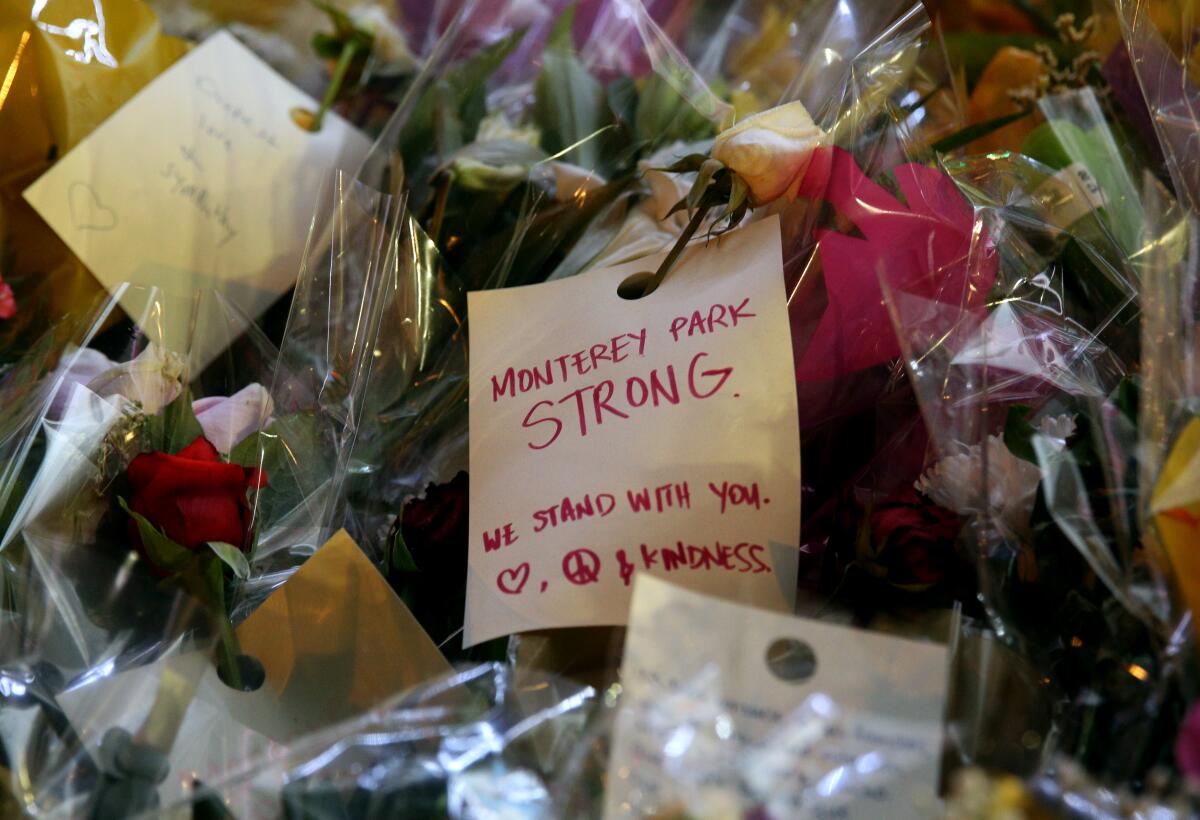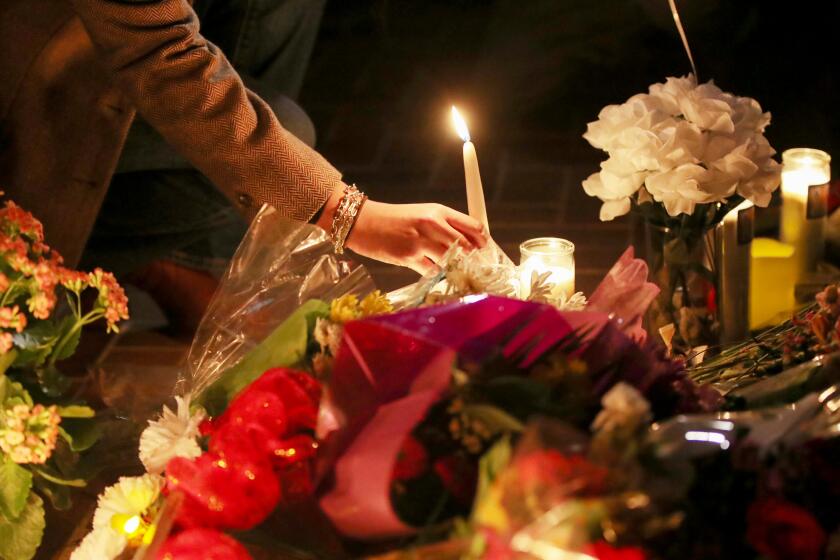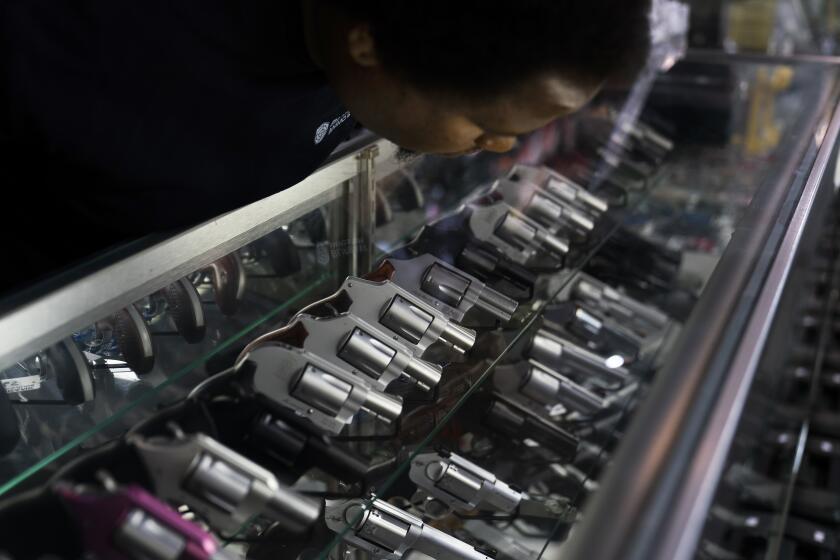New poll shows most California voters fear gun violence, but Democrats and Republicans are divided

Following two high-profile mass shootings in California, the majority of voters surveyed in a new statewide poll said they worry that gun violence will affect them or someone close to them.
The survey also revealed a stark political divide over fear about gun violence among Californians, and of the disproportional concern among women, city residents and people of color in the state.
Sixty-three percent of those surveyed said they were worried about becoming a victim of gun violence or having someone close to them being harmed, with 30% saying they were very concerned, according to a UC Berkeley Institute of Governmental Studies poll co-sponsored by the Los Angeles Times.
Fear was most prevalent among Democrats, with 78% expressing concern compared with 61% of unaffiliated independent voters and 36% of Republicans.
The deep political polarization on firearms in the United States “is evident everywhere in this poll,” said Mark DiCamillo, director of the Institute of Governmental Studies.
“What was most striking to me had to do with the fears of gun violence affecting their own personal lives. I wouldn’t have expected there to be a huge partisan divide on that,” DiCamillo said. “But the perception is very different. Republicans are not expressing nearly as much concern about it as Democrats. And that really ties into their views on guns more generally.”
Black, Asian, Latino and female voters, along with those who lived in urban and suburban areas, were more likely to report fear of being personally affected by gun violence than white, male and rural voters, the poll found.
Christian Heyne, vice president of policy and programs at Brady: United Against Gun Violence, called the results “jarring.”
“I don’t think there are people in other industrialized countries throughout the world that would have a similar percentage of fear by population. And I think that’s because we stand uniquely in a position where gun violence is a reality, that our laws and access to weapons mean that no community can feel safe from gun violence.”
That partisan divide extends to stricter gun control laws to prevent mass shootings. Forty-five percent of voters surveyed said they would help a great deal, and 18% said they would help some, while 34% said they would not help much.
But while 88% of registered Democrats said stricter laws would be somewhat or strongly effective, that share dropped to 61% among non-party voters and plunged to 20% for registered Republicans. Among the Republicans, 78% said stricter laws would not help much.
A majority of voters, 58%, said that expanding the availability of mental health services would help a great deal to reduce mass shootings, compared with 10% who said it would not help much. The partisan divide on that was much smaller than on gun regulation.
The poll also discovered widespread lack of information about whether the state’s so-called red-flag law, which allows police to temporarily take guns away from people who are a threat to themselves or others, is effective. Forty-one percent of voters said they believed the law was not being used enough, compared with just 6% who said it was being used too much. But 47% said they didn’t know enough about it to have an opinion.
Three mass shootings have been carried out in one week in California, in Goshen, Monterey Park and Half Moon Bay.
When asked if it was more important to impose restrictions on gun ownership or to protect 2nd Amendment rights, 60% of voters surveyed said they favored tighter rules on firearms possession compared with the 34% who considered preserving the right to bear arms more important.
Eighty-six percent of Democrats and 57% of unaffiliated voters considered stronger limits on gun ownership as more important than protecting gun rights, compared with 12% of Republicans who felt that way.
The numbers follow a wave of deadly gun violence in the state and back-to-back mass shootings in Monterey Park and Half Moon Bay. Those incidents renewed calls among Democrats for greater restrictions around who can possess a firearm in California and initiated a slew of state legislation to crack down on gun violence.
Among the more high-profile bills is one to limit who can obtain a concealed-carry permit in the state and another that would ban firearms dealers from holding game-style promotional events such as giveaways, lotteries and raffles.
Others include imposing an excise tax on firearms and ammunition to fund violence prevention programs, requiring owners to buy gun liability insurance and prohibiting the sale of body armor frequently worn by mass shooters.
But efforts to enhance policies could be hampered by the courts, which are still trying to figure out how to interpret a sweeping U.S. Supreme Court ruling against restrictive laws for those seeking concealed-carry gun permits.
Second Amendment advocates seized on that ruling to initiate a wave of new litigation against gun control laws they consider unconstitutional and ineffective at preventing firearm violence.
The Supreme Court’s overturning of a New York law restricting people’s right to carry firearms in public has reinvigorated a legal war on California’s gun laws.
Sam Paredes, executive director of Gun Owners of California, said he wasn’t surprised by some of the numbers in the poll that underscored partisan differences over firearms.
“But the reality is it doesn’t matter what anybody thinks about imposing more gun control or anything. We have the 2nd Amendment. It is clearly defined,” Paredes said.
And, he added, “There’s no more hardcore gun control stuff that [Democrats] can do, because they’re already doing it all. And they are sad because they know that a lot of those laws are going to go away very, very soon.”
The Berkeley IGS poll surveyed 7,512 California registered voters online in English and Spanish from Feb. 14 to 20. Because the survey results are weighted to match census and voter registration benchmarks, precise estimates of the margin of error are difficult; however, the results are estimated to have a margin of error of 2 percentage points in either direction for the full sample.
More to Read
Get the L.A. Times Politics newsletter
Deeply reported insights into legislation, politics and policy from Sacramento, Washington and beyond. In your inbox three times per week.
You may occasionally receive promotional content from the Los Angeles Times.













